The Forest for the Cheese
February 17, 2025
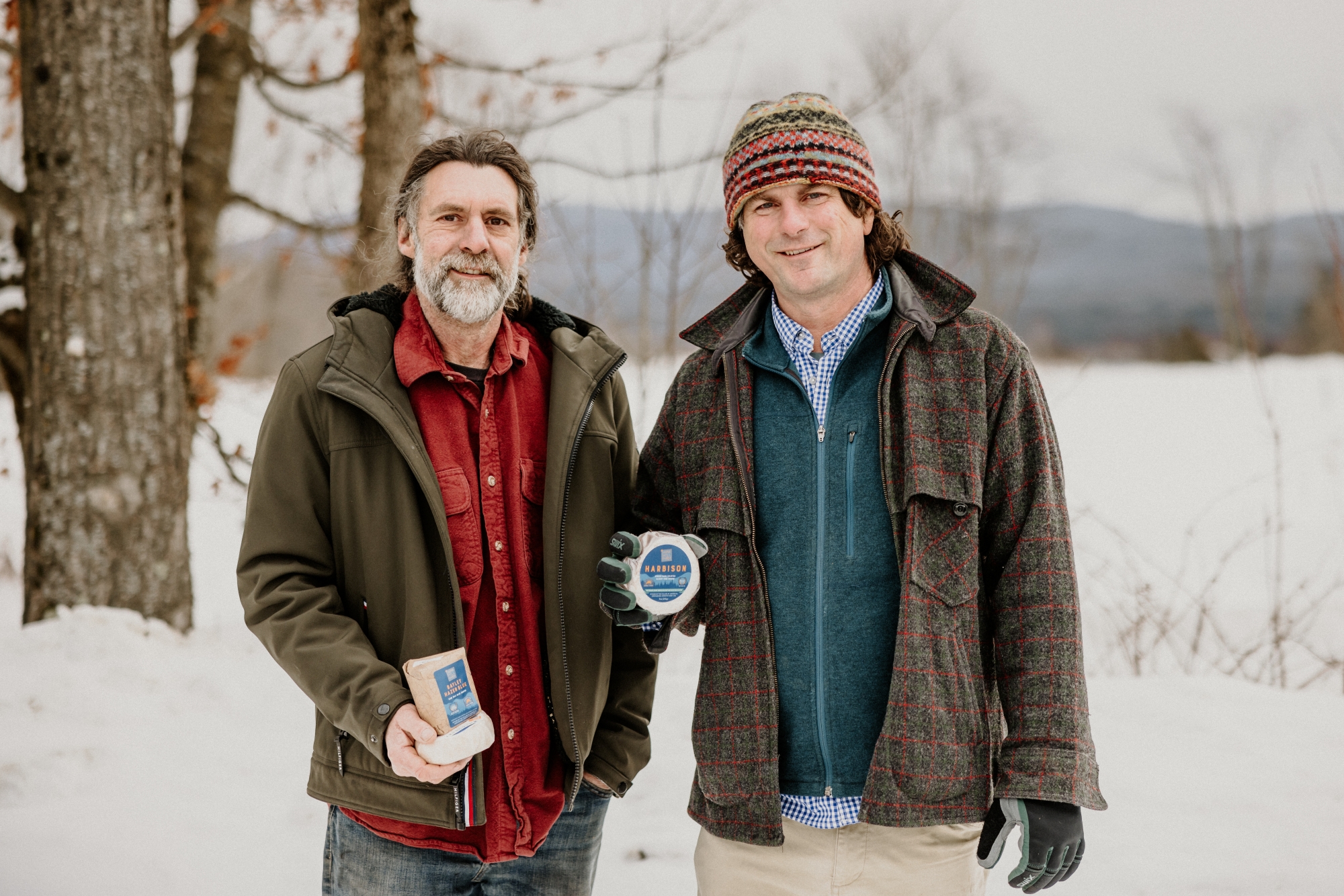
Jasper Hill brings Vermont’s forested and pastoral landscapes together in its award-winning cheeses
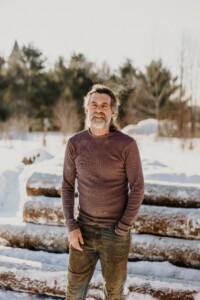
Dave DuCharme always wanted to work in the woods, following his parents, grandparents, and brothers into careers in the forest economy. Photo by Hannah Natalya.
For a few months out of the year, cambium–a thin layer of wood underneath the bark of spruce trees–can be carefully harvested and sold at a premium to some of the world’s most distinguished cheesemakers. Highly coveted for both pragmatic (it gives softer cheeses structure and flavor) and nostalgic (it originated with cheesemakers in the French and Swiss Alps) reasons, there are only a few people in the world who produce cambium, and one of them is David DuCharme in Greensboro, Vermont.
DuCharme always wanted to work in the woods, following his parents, grandparents, and brothers into careers in the forest economy. He owned a sawmill in Greensboro until 2016, when he transitioned his business to provide the nearby Jasper Hill Farm with cambium strips for their award-winning Harbison and Winnimere cheeses.
“We’re looking to create place-based cheeses that reflect the natural economy of our landscape,” said Mateo Kehler, CEO of Jasper Hill. “Our landscape is the footprint of farmers who harvest wood in the winter, sugar in the spring, and milk cows all year round. The idea was to create a cheese that married the field and the forest.”
The problem, of course, was the limited window in which cambium can be harvested. The thin layer underneath the bark naturally separates when the spruce tree sap starts to flow in the spring to allow for new growth, but by mid-summer is nearly impossible to remove. In 2014, Andy and Mateo Kehler, the owners of Jasper Hill Farm, approached DuCharme to help figure out how they could harvest more cambium locally.
“It’s the life force of the tree,” said DuCharme. “All the nutrients and water flow through the cambium. It’s very much alive and it’s also very thin, about one-eighth to one-sixteenth of an inch. But outside of that short window, you can’t even take it off with a chisel.”
DuCharme, who has a degree in math and computer science, sat down with a small team of cheesemakers and engineers in 2014 to come up with ideas to harvest cambium year round. None of the ideas stuck.
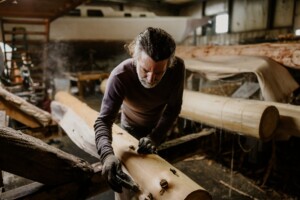
Dave DuCharme produces about 2,500 strips of cambium a day, all of which is sent three miles up the road to Jasper Hill Farm. Photo by Hannah Natalya.
“A life changing moment”
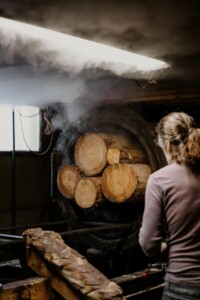
Dave DuCharme used steam to separate the cambium from the bark. Photo by Hannah Natalya.
It wasn’t until two years later, in 2016, when DuCharme closed his sawmill that he had the idea that would change the trajectory of his career. “It was heartbreaking watching the sawmill industry evolve,” he said. “After nearly three decades of sawing, my biggest customer decided to source all of their wood from outside of the country. I wasn’t sure what I was going to do,” he said. “I had no income. I was toying with getting a ‘real job’ working for someone else.”
He started thinking about the cambium again and woke up one morning with an idea. Would pressurized steam work to separate the cambium from the bark? He went outside, cut down a small spruce, and put a piece in the pressure cooker on his stove for an hour. “The cambium fell right off,” he said. “I jumped in my car and showed it to Andy. I think he still has it on his desk. It was a life changing moment, really, for all of us.”
With their business growing, Jasper Hill assured DuCharme they would buy all the cambium he could make. “I had $1,500 to work with,” he said. “So, I bought an old LP tank and, with a bunch of scrap steel, built a pressure cooker that could hold up to eight, smaller diameter, spruce logs.”
“He’s a genius,” said Mateo Kehler. “He completely reinvented the way cambium can be harvested. He may be one of the handiest, out-of-the-box thinkers I’ve ever met.”
Connecting field and forest
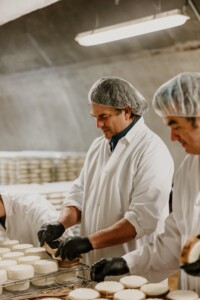
Mateo Kehler, CEO of Jasper Hill wraps cheese with locally harvested spruce bark. Photo by Hannah Natalya.
Today, DuCharme is producing about 2,500 strips of cambium a day, all of which is sent three miles up the road to Jasper Hill Farm. He harvests the wood locally himself, mostly right in Greensboro. The logs are brought into his shop where the bark is removed before being placed in the pressure cooker. After about an hour, he removes the logs, makes a slit down the cambium and removes it in one sheet. From there, it’s cut into one-inch strips and put on a drying rack. Working full-time, with a few weeks off in early summer, he’s able to supply about 40 percent of the cambium Jasper Hill needs. The rest comes from France.
“We always have to have a strategic bark reserve,” said Mateo Kehler. “Harbison specifically is such an important part of our collection. If we could double the amount we buy locally, we would–even if it cost more–because it aligns with our values and the purpose of the business.”
That purpose, says Kehler, is to revitalize an economy built from the working landscape. “We built a pipeline to markets where there is disposable income and put high-value products into that pipeline so we can extract capital and bring it back to the community,” he said. “It’s about more than dairy–there are more loggers here than farmers up here. When we make products that are authentic and reflect the place where they are made, we can tell a different story about the working landscape and create more value for the people living on it.”
In addition to DuCharme, Jasper Hill purchases packaging made from wood shavings from Sylvacurl in East Hardwick and, in recent years, has begun building a trail system in the forestland they own. “We’re planting spruce to harvest, and also managing the forest for songbirds and recreation,” he said.
More demand than supply
Just across from his workshop lies another of DuCharme’s projects–his sailboat. At 60, he’s thinking about his next chapter, which he says will involve exploring the world on his boat. Both DuCharme and Kehler are hopeful someone will want to take over, and perhaps expand, the cambium business DuCharme established in Greensboro.
“It’s a pretty special business,” said DuCharme. “All of the wood is cut and sold within a ten-mile radius. The money stays right here in the community. Someone who is inspired could not only supply everything for Jasper Hill, but could also start mail order. The demand is there.”
The forest industry in Vermont is “never going to be the same,” says DuCharme. But there is opportunity for boutique, niche businesses like his to thrive. Kehler agrees. “We want to focus on growing hay, milking cows, and making cheese,” he said. “So, we’re pretty invested in creating the circumstances for someone to train with Dave and, eventually, own a business in the community. I really hope there’s someone who wants to take that on.”
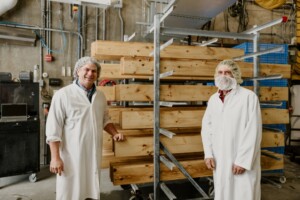
Mateo Kehler and Dave DuCharme at Jasper Hill Farm. Photo by Hannah Natayla.
About the Vermont Forest Products Program
Vermont’s forest economy contributes more than $2 billion in direct economic output and provides more than 13,000 jobs in forestry, logging, processing, specialty woodworking, construction, wood heating, maple production, and forest-based recreation. The Forest Products Development Program at the Vermont Sustainable Jobs Fund (VSJF) creates space for strong relationships and collaboration throughout the industry and promotes the development of new and existing markets for Vermont wood products. Learn more at www.vsjf.org.
Read More Stories Like This:
- Reimagining a forest products industry that solves problems for people and planet
- DeltaClimeVT Business Accelerator: Vermont—a great place to test new climate technology
- Business Coaching: Supporting Vermont’s small businesses for a wellbeing economy
- Vermont Farm to Plate: Working toward the goals of the Vermont Agriculture and Food System Strategic Plan 2021–2030
- JUST RELEASED: VSJF Impact Report 2024
- Business Sense – complete FREE training series for entrepreneurs and small business owners now available




